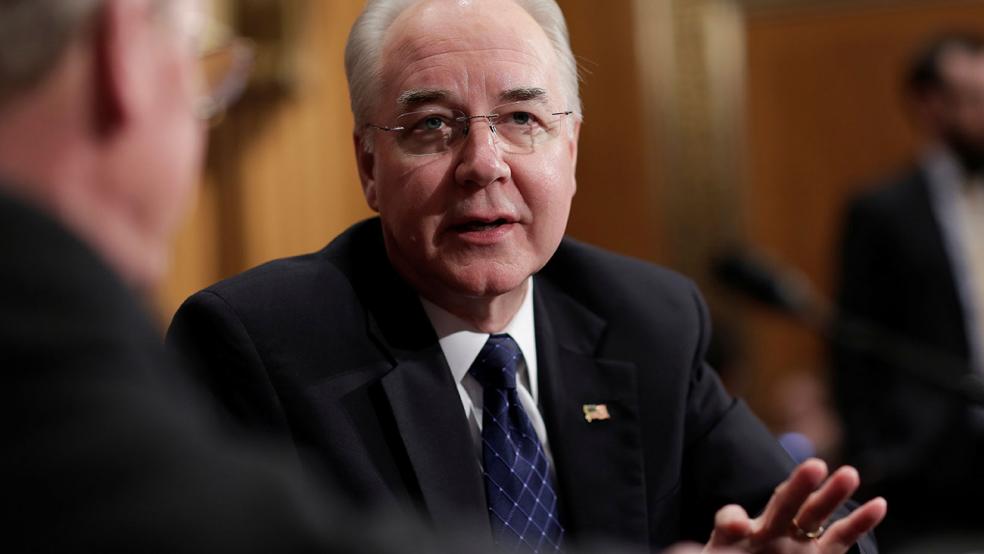Despite his best efforts to put the controversy behind him, there’s mounting evidence that Health and Human Services Secretary Tom Price lined his pockets while a member of Congress with stock trades through insider information or legislative actions that boosted the value of his holdings.
ProPublica, the non-partisan investigative website, reported last week that on the same day last year that Price purchased up to $90,000 of stock in six pharmaceutical companies through a broker, the Georgia Republican arranged to call a top official at HHS, “seeking to scuttle” a controversial rule that might have hurt the firms’ profits and depressed their share prices.
Related: Stock Trades by Trump’s Top Health Care Reformer Raise Some Swampy Questions
The former House Budget Committee chair and influential Ways and Means Committee member on health care matters was peppered with questions about his more dubious stock transactions during his Senate confirmation hearings in late January. The questioning was sparked by a bombshell Wall Street Journal report in December that Price had traded more than $300,000 worth of shares in health companies over a recent four-year period while taking legislative actions that could have affected those companies.
Senate Democrats and government watchdogs called for a Securities and Exchange Commission investigation citing “possible violations” of insider trading rules and federal ethics laws. Former U.S. attorney Preet Bharara of New York reportedly was overseeing an investigation of Price’s stock dealings before Bharara was fired by President Trump last month along with other U.S. attorneys, despite receiving Trump’s personal assurance that he would be kept on.
Price, a wealthy former orthopedic surgeon from suburban Atlanta and Trump’s point man on the administration’s failed effort to replace Obamacare with the American Health Care Act, has repeatedly denied any wrongdoing. He told ABC’s This Week with George Stephanopoulos last month that he and his lawyers hadn’t received any indication of a federal probe into his stock transactions.
“I know nothing about that whatsoever,” Price said.
Yet Price – now the head of the nation’s premier public health and research agency – may have parlayed his position as a senior Republican member of Congress to his financial advantage.
Related: Trump’s Health Secretary Invested in a Company Linked to the Opioid Epidemic
Here are five of the most troubling reports and questions about Price’s stock transactions while he served as a member of Congress:
- The December analysis by The Wall Street Journal revealed that Price bought and sold stock worth more than $300,000 in 40 health care, pharmaceutical and biomedical companies since 2012. Those stock holdings included Aetna Inc., Pfizer Inc, Amgen Inc., Bristol-Myers Squibb Co. and Eli Lilly & Co.
In recent years, Price, a leading conservative voice on health care, sponsored or co-sponsored 44 bills with potentially important financial impact on the U.S. healthcare system, insurers, and the drug industry. Price subsequently divested himself of the stocks after he was nominated to head HHS. - Price purchased stock in Innate Immunotherapeutics, an Australian company, in 2015 and 2016 that stood to benefit from pending legislation that permitted speedier clinical trials. Price testified during his Senate Finance Committee hearings that he had purchased the stock at the same price that was available to all other investors.
However, according to The Wall Street Journal, Price had purchased between $50,000 and $100,000 worth of the stock at a 12 percent discount in two separate private placements – a deal that actually had been offered to fewer than 20 U.S. investors. One of Price’s friends, Rep. Christopher Collins (R-NY), a major investor in the company, had steered Price towards the deal. Price, Collins and the company have all given conflicting accounts of what precisely occurred. - CNN reported in early January that Price purchased stock in a medical device manufacturer last year just days before he introduced a bill designed to protect the company from an adverse government regulation.
Last March, Price bought shares worth $1,000 to $15,000 in Zimmer-Biomet, a leading manufacturer of knee and hip replacements. Barely a week later, the Georgia Republican introduced a bill to delay until 2018 a new Centers for Medicare & Medicaid Services (CMS) reimbursement formula that analysts warned would be financially harmful to the company when fully implemented. - Price invested last year in a major prescription drug distribution company that over the years has been linked to the nationwide epidemic of opioid abuse and deadly overdoses.
McKesson Corp., the largest drug distributor in the U.S., has been the target of two publicly disclosed U.S. Drug Enforcement Administration actions, according to The Washington Post. The company subsequently paid $163 million in fines in response to allegations that it “failed to report hundreds of suspicious orders for millions of pain pills” from internet pharmacies and others. - The latest report by ProPublica provides an important new wrinkle to what already was known about a March 17, 2016, incident in which Price’s broker purchased shares worth between $1,000 and $15,000 each in Eli Lilly, Amgen, Bristol-Meyers Squibb, McKesson, Pfizer, and Biogen.
It was previously known that a month later, Price joined other Republican and Democratic lawmakers in sponsoring a bill that would have stymied an Obama administration rule intended to remove the incentive for physicians to prescribe costly drugs that result in mixed patient outcomes.
That wasn’t known until now is that Price made a direct, personal appeal to the CMS regarding the Medicare Part B drug payment rule within a week of purchasing the stock. The same day as the stock transaction, Price’s legislative aide emailed the agency to set up the call.





